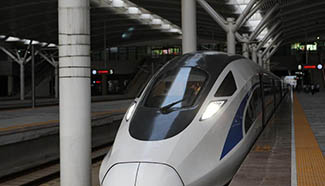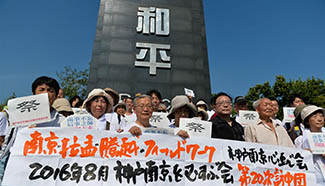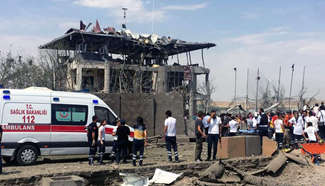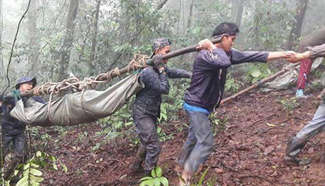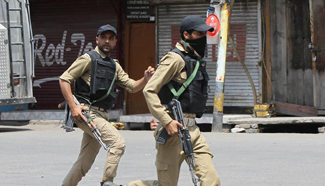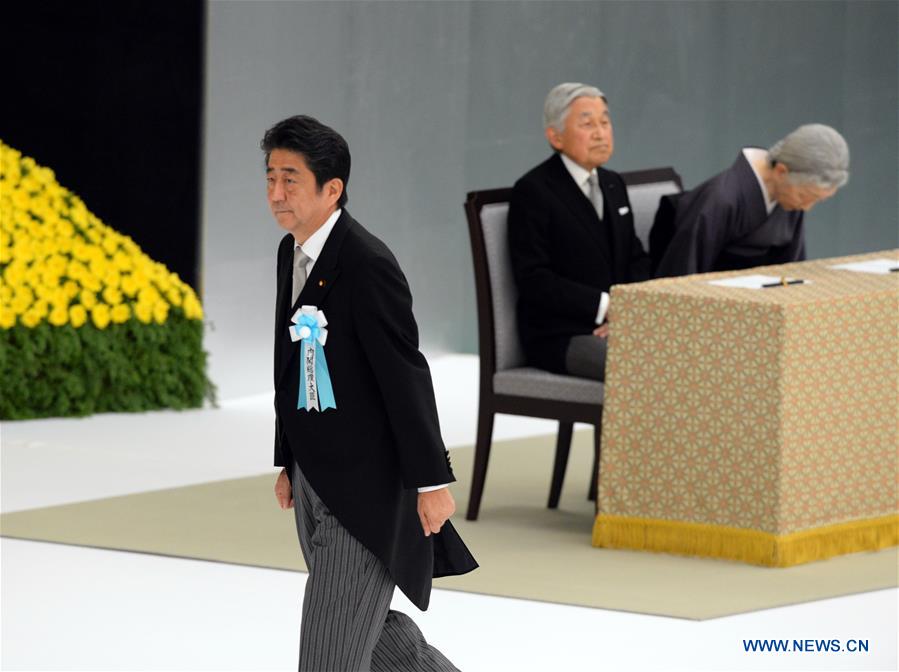
Japanese Prime Minister Shinzo Abe (front) attends the ceremony marking the 71st anniversary of Japan's unconditional surrender in World War II in Tokyo, Japan, Aug. 15, 2016. The Japanese government held an annual ceremony Monday in Tokyo to mark the 71st anniversary of Japan's unconditional surrender in World War II (WWII) and Prime Minister Shinzo Abe once again failed to mention "reflection" over the past war. (Xinhua/Ma Ping)
BEIJING, Aug. 15 (Xinhua) -- Monday marks the 71st anniversary of Japan's unconditional surrender in World War II, but more than seven decades on, Japan remains stuck in the quagmire of its wartime past, continues to ignore its wartime responsibilities and moves further and further to the right in its politics.
For the fourth year running at the annual memorial service for Japanese war dead, Prime Minister Shinzo Abe neither touched on Japan's responsibilities regarding the devastating war, nor offered condolences to other Asian nations.
Once again, this only serves to remind Japan's neighbors of the great disservice done to them, and of the absence of any sincere remorse from Abe's administration.
In his speech delivered on Aug. 14 last year, Abe noted that Japan must not let its future generations, who have nothing to do with the war, "be predestined to apologize."
A genuine and resolute apology could never be a disgrace to Japan or any of its generation, but instead would represent the right attitude from the Japanese government in order to regain the complete trust and respect of its neighbors.
If the Abe administration refuses to honestly reflect and repent on its war guilt, how can it prevent its future generations from apologizing?
In December 2015, Japan reached a "final and irreversible" agreement with South Korea over its wartime use of sex slaves or "comfort women," which involved the payment of just 1 billion yen (about 8.3 million U.S. dollars) and no official apology from Tokyo.
Monetary payment alone will not heal the damage caused by Japan's past militarism, nor does it address the dangerous current trend towards militarism.
The Japanese government has made a series of proactive moves, which include but are not limited to: an increased arms trade, weaker civilian control over the military, and controversial security legislation that attempts to rebuild the country as a military power.
In its 2016 defense paper issued on Aug. 2, Japan shamelessly accused China of jeopardizing regional peace and stability, playing up the "China Threat" to further justify its rightist and militarist moves.
As a matter of fact, Japan's resurgent militarism is rooted in its reluctance to admit to its history of aggression and its failure to hold its war criminals responsible after surrender.
The word surrender never even appeared in Japanese Emperor Hirohito's speech declaring the acceptance of the Potsdam Proclamation, broadcast Aug. 15, 1945. The Japanese continue to downplay the significance of Aug. 15 as the memorial day for the end of the war.
In past decades, regardless of war victims' feelings, Japanese political figures have visited and paid tribute to the Yasukuni Shrine that honors 14 Class-A convicted war criminals, which only raises suspicion from its Asian neighbors that Japan may one day repeat its militarist history.
As long as it turns a blind eye to its responsibilities and guilt, Japan will never shake off it wartime past and move on as a normal country.
Related:
Commentary: 71 years on, Japan still haunted by specter of militarism
BEIJING, Aug. 15 (Xinhua) -- Seventy-one years following Japan's surrender in World War II, the specter of militarism is still haunting the country and the Asia-Pacific.
In his speech at a ceremony marking the anniversary in Tokyo on Monday, Japanese Prime Minister Shinzo Abe failed again to offer a sincere apology for the country' s wartime aggression in Asia, and failed to pledge not to return to war. Full story
TOKYO, Aug. 15 (Xinhua) -- History is a mirror to the future. If Japan continues to view its war-time past distorted and whitewashed by rightwing revisionists without earnest reflection and repentance, it will have a precarious future in which "horrors of war" could be repeated.
Aug. 15 marks the day when Japan unconditionally surrendered in World War II, bringing an end to the war, the deadliest conflict in human history that witnessed the loss of about 70 million lives. Full story



